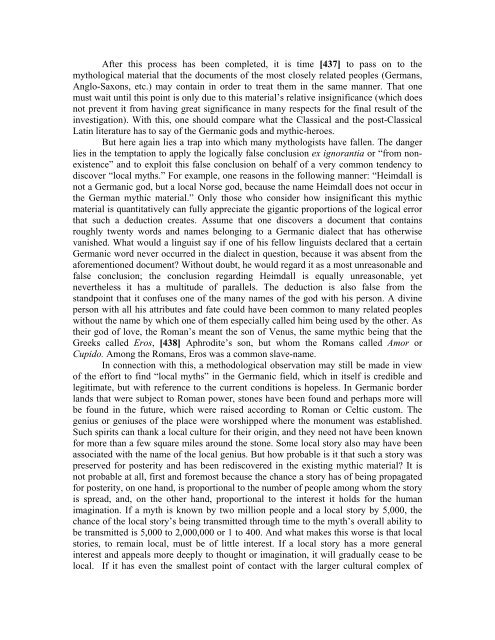Towards a Method of Mythology - Germanic Mythology
Towards a Method of Mythology - Germanic Mythology
Towards a Method of Mythology - Germanic Mythology
You also want an ePaper? Increase the reach of your titles
YUMPU automatically turns print PDFs into web optimized ePapers that Google loves.
After this process has been completed, it is time [437] to pass on to the<br />
mythological material that the documents <strong>of</strong> the most closely related peoples (Germans,<br />
Anglo-Saxons, etc.) may contain in order to treat them in the same manner. That one<br />
must wait until this point is only due to this material’s relative insignificance (which does<br />
not prevent it from having great significance in many respects for the final result <strong>of</strong> the<br />
investigation). With this, one should compare what the Classical and the post-Classical<br />
Latin literature has to say <strong>of</strong> the <strong>Germanic</strong> gods and mythic-heroes.<br />
But here again lies a trap into which many mythologists have fallen. The danger<br />
lies in the temptation to apply the logically false conclusion ex ignorantia or “from nonexistence”<br />
and to exploit this false conclusion on behalf <strong>of</strong> a very common tendency to<br />
discover “local myths.” For example, one reasons in the following manner: “Heimdall is<br />
not a <strong>Germanic</strong> god, but a local Norse god, because the name Heimdall does not occur in<br />
the German mythic material.” Only those who consider how insignificant this mythic<br />
material is quantitatively can fully appreciate the gigantic proportions <strong>of</strong> the logical error<br />
that such a deduction creates. Assume that one discovers a document that contains<br />
roughly twenty words and names belonging to a <strong>Germanic</strong> dialect that has otherwise<br />
vanished. What would a linguist say if one <strong>of</strong> his fellow linguists declared that a certain<br />
<strong>Germanic</strong> word never occurred in the dialect in question, because it was absent from the<br />
aforementioned document? Without doubt, he would regard it as a most unreasonable and<br />
false conclusion; the conclusion regarding Heimdall is equally unreasonable, yet<br />
nevertheless it has a multitude <strong>of</strong> parallels. The deduction is also false from the<br />
standpoint that it confuses one <strong>of</strong> the many names <strong>of</strong> the god with his person. A divine<br />
person with all his attributes and fate could have been common to many related peoples<br />
without the name by which one <strong>of</strong> them especially called him being used by the other. As<br />
their god <strong>of</strong> love, the Roman’s meant the son <strong>of</strong> Venus, the same mythic being that the<br />
Greeks called Eros, [438] Aphrodite’s son, but whom the Romans called Amor or<br />
Cupido. Among the Romans, Eros was a common slave-name.<br />
In connection with this, a methodological observation may still be made in view<br />
<strong>of</strong> the effort to find “local myths” in the <strong>Germanic</strong> field, which in itself is credible and<br />
legitimate, but with reference to the current conditions is hopeless. In <strong>Germanic</strong> border<br />
lands that were subject to Roman power, stones have been found and perhaps more will<br />
be found in the future, which were raised according to Roman or Celtic custom. The<br />
genius or geniuses <strong>of</strong> the place were worshipped where the monument was established.<br />
Such spirits can thank a local culture for their origin, and they need not have been known<br />
for more than a few square miles around the stone. Some local story also may have been<br />
associated with the name <strong>of</strong> the local genius. But how probable is it that such a story was<br />
preserved for posterity and has been rediscovered in the existing mythic material? It is<br />
not probable at all, first and foremost because the chance a story has <strong>of</strong> being propagated<br />
for posterity, on one hand, is proportional to the number <strong>of</strong> people among whom the story<br />
is spread, and, on the other hand, proportional to the interest it holds for the human<br />
imagination. If a myth is known by two million people and a local story by 5,000, the<br />
chance <strong>of</strong> the local story’s being transmitted through time to the myth’s overall ability to<br />
be transmitted is 5,000 to 2,000,000 or 1 to 400. And what makes this worse is that local<br />
stories, to remain local, must be <strong>of</strong> little interest. If a local story has a more general<br />
interest and appeals more deeply to thought or imagination, it will gradually cease to be<br />
local. If it has even the smallest point <strong>of</strong> contact with the larger cultural complex <strong>of</strong>
















